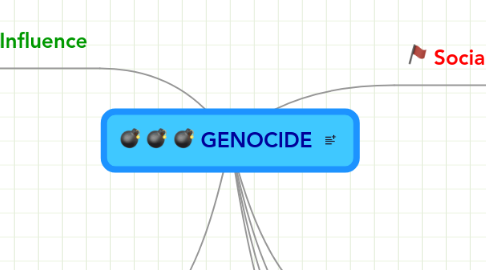GENOCIDE
by graham mackay


1. Social Influence
1.1. obedience to authority ( Milgrim)
1.1.1. eg: Rwandan's "culture of obedience"
1.2. conformity (Asch)
1.3. propaganda
1.3.1. eg: hate radio station telling Hutu's to kill Tutsi's
1.3.2. eg: Hutu's told that Tutsi's were not originally from Rwanda
1.4. social roles
1.5. social norms
1.6. bystander apathy/intervention
1.6.1. eg: USA/Western countries
1.6.2. eg: USA had "no incentive to intervene"
2. Social Relations
2.1. prejudice
2.1.1. aggression (displaced)
2.1.1.1. scapegoat theory
2.1.1.2. realistic conflict theory
2.1.1.3. eg: Nyarubuye church massacre
2.1.2. altruism
2.1.3. ethnocentrism
2.1.4. intergroup hostility
3. Social Cognition
3.1. blame victim
3.2. fundamental attribution error (correspondance bias)
3.3. difficult life conditions
3.3.1. 'in'/'out' groups
3.3.1.1. eg: Hutu's vs Tutsi's
3.3.1.2. social uncertainty
3.3.1.3. devaluation
3.3.1.4. identity
3.3.1.4.1. social identity theory
3.3.1.5. destructive ideologies
3.3.1.6. stereotypes
3.4. confirmation bias
3.5. heuristics
3.6. illusory correlations
3.6.1. belief perseverance
3.6.2. eg: PM's plane shot down
3.7. social categorisation theory
4. economic factors
5. cultural history
6. situational factors
6.1. destabilising crisis
6.2. authoritarian leaders
6.2.1. eg: extremist Hutu PM
